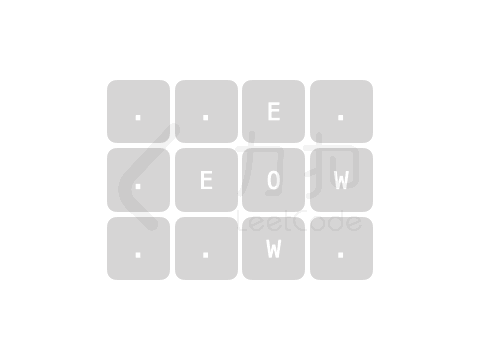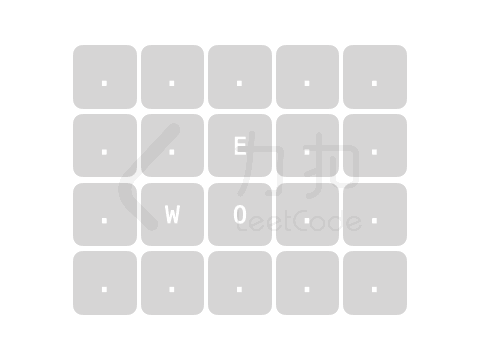| comments | difficulty | edit_url |
|---|---|---|
true |
中等 |
欢迎各位来到「力扣嘉年华」,接下来将为各位介绍在活动中广受好评的弹珠游戏。
N*M 大小的弹珠盘的初始状态信息记录于一维字符串型数组 plate 中,数组中的每个元素为仅由 "O"、"W"、"E"、"." 组成的字符串。其中:
"O"表示弹珠洞(弹珠到达后会落入洞中,并停止前进);"W"表示逆时针转向器(弹珠经过时方向将逆时针旋转 90 度);"E"表示顺时针转向器(弹珠经过时方向将顺时针旋转 90 度);"."表示空白区域(弹珠可通行)。
游戏规则要求仅能在边缘位置的 空白区域 处(弹珠盘的四角除外)沿 与边缘垂直 的方向打入弹珠,并且打入后的每颗弹珠最多能 前进 num 步。请返回符合上述要求且可以使弹珠最终入洞的所有打入位置。你可以 按任意顺序 返回答案。
注意:
- 若弹珠已到达弹珠盘边缘并且仍沿着出界方向继续前进,则将直接出界。
示例 1:
输入 �:
num = 4>plate = ["..E.",".EOW","..W."]输出:
[[2,1]]解释: 在
[2,1]处打入弹珠,弹珠前进 1 步后遇到转向器,前进方向顺时针旋转 90 度,再前进 1 步进入洞中。{:width="300px"}
示例 2:
输入 �:
num = 5>plate = [".....","..E..",".WO..","....."]输出:
[[0,1],[1,0],[2,4],[3,2]]解释: 在
[0,1]处打入弹珠,弹珠前进 2 步,遇到转向器后前进方向逆时针旋转 90 度,再前进 1 步进入洞中。 在[1,0]处打入弹珠,弹珠前进 2 步,遇到转向器后前进方向顺时针旋转 90 度,再前进 1 步进入洞中。 在[2,4]处打入弹珠,弹珠前进 2 步后进入洞中。 在[3,2]处打入弹珠,弹珠前进 1 步后进入洞中。{:width="350px"}
示例 3:
输入 �:
num = 3>plate = [".....","....O","....O","....."]输出:
[]解释: 由于弹珠被击中后只能前进 3 步,且不能在弹珠洞和弹珠盘四角打入弹珠,故不存在能让弹珠入洞的打入位置。
提示:
1 <= num <= 10^61 <= plate.length, plate[i].length <= 1000plate[i][j]仅包含"O"、"W"、"E"、"."
我们注意到,从不同的位置打入弹珠,弹珠的前进路线不会重叠。因此,我们可以枚举所有可能的打入位置,然后模拟弹珠的前进过程,判断是否能够入洞,是则将该位置加入答案。
在实现上,我们定义一个方向数组
时间复杂度
class Solution:
def ballGame(self, num: int, plate: List[str]) -> List[List[int]]:
def check(i, j, d):
k = num
while plate[i][j] != 'O':
if k == 0:
return False
if plate[i][j] == 'W':
d = (d + 3) % 4
elif plate[i][j] == 'E':
d = (d + 1) % 4
i, j = i + dirs[d], j + dirs[d + 1]
if not (0 <= i < m and 0 <= j < n):
return False
k -= 1
return True
dirs = (0, 1, 0, -1, 0)
m, n = len(plate), len(plate[0])
ans = []
for i in range(1, m - 1):
if plate[i][0] == '.' and check(i, 0, 0):
ans.append([i, 0])
if plate[i][n - 1] == '.' and check(i, n - 1, 2):
ans.append([i, n - 1])
for j in range(1, n - 1):
if plate[0][j] == '.' and check(0, j, 1):
ans.append([0, j])
if plate[m - 1][j] == '.' and check(m - 1, j, 3):
ans.append([m - 1, j])
return ansclass Solution {
private String[] plate;
private int num;
private int m;
private int n;
private final int[] dirs = {0, 1, 0, -1, 0};
public int[][] ballGame(int num, String[] plate) {
this.num = num;
this.plate = plate;
this.m = plate.length;
this.n = plate[0].length();
List<int[]> ans = new ArrayList<>();
for (int i = 1; i < m - 1; ++i) {
if (plate[i].charAt(0) == '.' && check(i, 0, 0)) {
ans.add(new int[] {i, 0});
}
if (plate[i].charAt(n - 1) == '.' && check(i, n - 1, 2)) {
ans.add(new int[] {i, n - 1});
}
}
for (int j = 1; j < n - 1; ++j) {
if (plate[0].charAt(j) == '.' && check(0, j, 1)) {
ans.add(new int[] {0, j});
}
if (plate[m - 1].charAt(j) == '.' && check(m - 1, j, 3)) {
ans.add(new int[] {m - 1, j});
}
}
return ans.toArray(new int[0][]);
}
private boolean check(int i, int j, int d) {
int k = num;
while (plate[i].charAt(j) != 'O') {
if (k == 0) {
return false;
}
if (plate[i].charAt(j) == 'W') {
d = (d + 3) % 4;
} else if (plate[i].charAt(j) == 'E') {
d = (d + 1) % 4;
}
i = i + dirs[d];
j = j + dirs[d + 1];
if (i < 0 || i >= m || j < 0 || j >= n) {
return false;
}
--k;
}
return true;
}
}class Solution {
public:
vector<vector<int>> ballGame(int num, vector<string>& plate) {
int m = plate.size(), n = plate[0].size();
vector<vector<int>> ans;
int dirs[5] = {0, 1, 0, -1, 0};
auto check = [&](int i, int j, int d) -> bool {
int k = num;
while (plate[i][j] != 'O') {
if (k == 0) {
return false;
}
if (plate[i][j] == 'W') {
d = (d + 3) % 4;
} else if (plate[i][j] == 'E') {
d = (d + 1) % 4;
}
i += dirs[d];
j += dirs[d + 1];
if (i < 0 || i >= m || j < 0 || j >= n) {
return false;
}
--k;
}
return true;
};
for (int i = 1; i < m - 1; ++i) {
if (plate[i][0] == '.' && check(i, 0, 0)) {
ans.push_back({i, 0});
}
if (plate[i][n - 1] == '.' && check(i, n - 1, 2)) {
ans.push_back({i, n - 1});
}
}
for (int j = 1; j < n - 1; ++j) {
if (plate[0][j] == '.' && check(0, j, 1)) {
ans.push_back({0, j});
}
if (plate[m - 1][j] == '.' && check(m - 1, j, 3)) {
ans.push_back({m - 1, j});
}
}
return ans;
}
};func ballGame(num int, plate []string) (ans [][]int) {
dirs := [5]int{0, 1, 0, -1, 0}
m, n := len(plate), len(plate[0])
check := func(i, j, d int) bool {
k := num
for plate[i][j] != 'O' {
if k == 0 {
return false
}
if plate[i][j] == 'W' {
d = (d + 3) % 4
} else if plate[i][j] == 'E' {
d = (d + 1) % 4
}
i += dirs[d]
j += dirs[d+1]
if i < 0 || i >= m || j < 0 || j >= n {
return false
}
k--
}
return true
}
for i := 1; i < m-1; i++ {
if plate[i][0] == '.' && check(i, 0, 0) {
ans = append(ans, []int{i, 0})
}
if plate[i][n-1] == '.' && check(i, n-1, 2) {
ans = append(ans, []int{i, n - 1})
}
}
for j := 1; j < n-1; j++ {
if plate[0][j] == '.' && check(0, j, 1) {
ans = append(ans, []int{0, j})
}
if plate[m-1][j] == '.' && check(m-1, j, 3) {
ans = append(ans, []int{m - 1, j})
}
}
return
}
